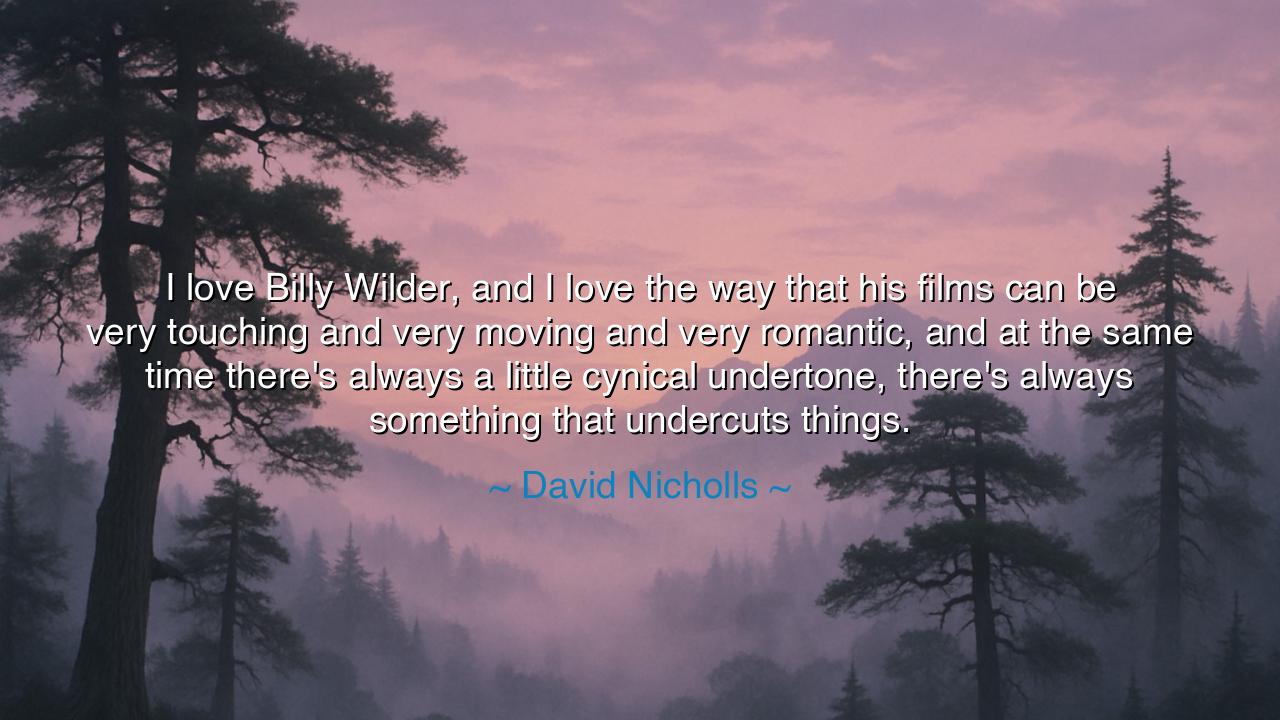
I love Billy Wilder, and I love the way that his films can be
I love Billy Wilder, and I love the way that his films can be very touching and very moving and very romantic, and at the same time there's always a little cynical undertone, there's always something that undercuts things.






In the thoughtful words of David Nicholls, "I love Billy Wilder, and I love the way that his films can be very touching and very moving and very romantic, and at the same time there's always a little cynical undertone, there's always something that undercuts things," we are invited to explore the complex interplay between romance and cynicism in the world of storytelling. Wilder, a master of cinema, captured the essence of human experience with a delicate balance between beauty and disillusionment, offering audiences the idealism of love and the harshness of reality. Nicholls’s admiration for Wilder reflects a timeless truth about the human condition: we are drawn to both the uplifting and the bittersweet—those moments when hope and doubt exist side by side, creating a more complete and authentic reflection of life.
The ancients, too, were no strangers to this duality. The Greek tragedies of Sophocles and Euripides often portrayed noble characters striving for greatness or love, only to be thwarted by forces beyond their control, forces that were often merciless in their cruelty. Take, for example, the myth of Oedipus, whose quest for truth and self-understanding leads him to a tragic and irreversible revelation about his own fate. Despite his noble intentions, the gods impose a harsh and cynical reality on him. In this way, the romantic ideal is undercut by the cruel forces of fate, echoing the cynical undertone that Nicholls sees in Wilder’s films. Both forms of storytelling draw attention to the tension between dreams and disappointment, between the longing for love and the inescapable truth of human flaws.
The combination of romance and cynicism in Wilder’s work echoes a similar tension found in the Roman literature of Ovid, whose Metamorphoses is filled with both the tender emotions of love and the capricious, often tragic twists of fate. Cupid, the god of love, strikes characters with arrows that lead to moments of intense passion, but often these feelings are thwarted or corrupted by misunderstandings or divine intervention. The notion of romantic love in Ovid’s stories is both desirable and dangerous, and its outcome is never guaranteed. This duality of love as both a source of joy and suffering permeates much of literature, reflecting the reality that desire and disillusionment are inextricably linked in the human experience. Wilder’s films, like Ovid’s tales, offer romanticism only to reveal the complexities and complications that love brings.
Nicholls’s appreciation for this balance also speaks to the nature of humanity—our ability to find meaning in life’s contradictions. In Shakespeare’s Much Ado About Nothing, the witty exchange between Beatrice and Benedick showcases a blend of romantic idealism with irony, as the characters’ evolving love is filled with sarcasm and self-doubt, only to culminate in the sincere joy of union. The cynicism of their banter undercuts the idealism of romance, yet in doing so, it deepens their relationship, showing that love is not merely the absence of struggle but the embrace of it. In this light, Nicholls’s admiration for Wilder is a recognition of the complexity of love and life—where hope and despair often coexist, making the journey more genuine and relatable.
The cynical undertone in Wilder’s work invites the audience to consider the realities that often underlie the idealized versions of love and happiness. It challenges the viewer to ask: What is love without its obstacles, its doubts, its imperfections? In modern storytelling, this tension remains a fundamental theme. Woody Allen, for example, has crafted films like Annie Hall, where the romantic idealism of the protagonist is continually undermined by the awkwardness of reality, yet this undercutting makes the love story feel more authentic. Similarly, in Wilder’s work, the beauty of romance is always tempered by the complexities of human nature, revealing that the pursuit of love is often not as pure as it seems. Yet, in this imperfection, there is beauty, because it reflects the truth of the human experience.
Nicholls’s reflection on Wilder’s films carries with it a lesson about the nature of storytelling—that the greatest works are those that capture both the romantic and the cynical, the light and the dark. These stories do not offer easy answers, but rather they allow us to sit with the tension of life’s contradictions, accepting that both idealism and realism shape our experiences. Just as in the ancient stories, where heroes must face the duality of their desires and the forces that challenge them, we too must navigate the complexities of love, ambition, and hope.
In your own life, take inspiration from Wilder’s films and the wisdom of the ancients. Embrace the romantic moments, but recognize the cynicism that often accompanies them. The cynical undertone is not a rejection of love or happiness, but a reminder that life is complex, and love, in its most authentic form, often requires overcoming doubts, struggles, and challenges. Do not shy away from these complexities, but rather, embrace them, for it is in the tension between romance and reality that true growth and understanding emerge. Love, like the stories of old, is not just about idealism but about navigating the realities of the heart and soul.






AAdministratorAdministrator
Welcome, honored guests. Please leave a comment, we will respond soon